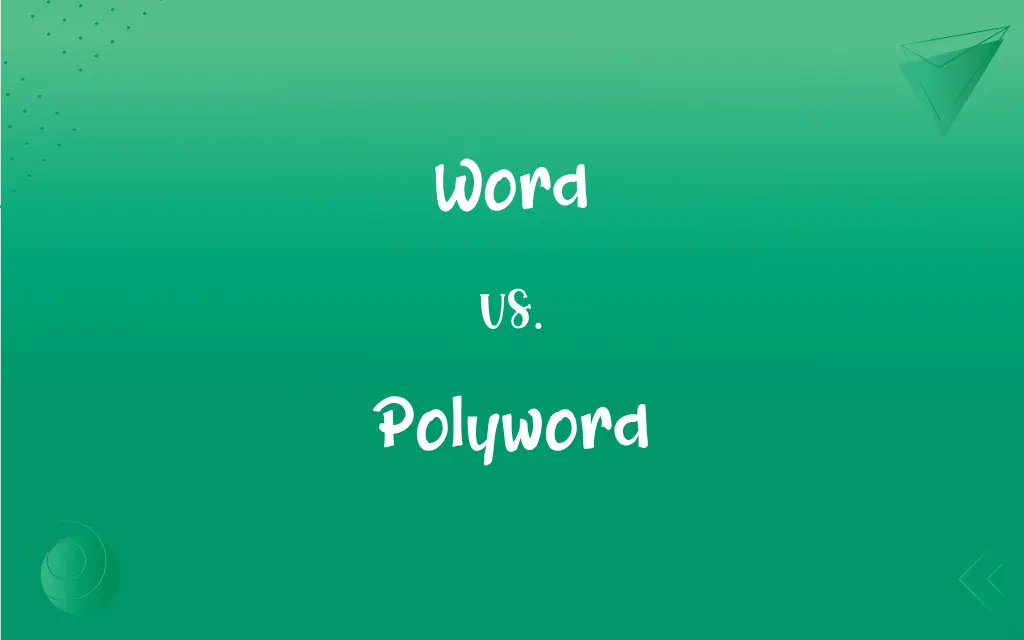Word vs. Polyword: What's the Difference?
Edited by Harlon Moss || By Janet White || Updated on September 28, 2023
A word is a single distinct meaningful element of speech or writing, while a polyword is a sequence of words that has a single meaning, acting as a unit within a sentence.

Key Differences
A word and a polyword differ significantly in their construction and utilization within a language. A word is the basic unit of a language, identified as a sequence of letters that has a specific meaning and is typically separated by spaces in written language. It acts as a standalone entity with its own meaning. In contrast, a polyword is a combination of words that, together, convey a unique meaning. A polyword functions as a unit within the larger syntactical structure and is distinct from the sum of its parts.
The essence of a word lies in its individuality and integrity. It is the foundation of language, facilitating communication by conveying meanings, representing ideas, or denoting objects. A word is a singular entity, coherent and self-contained. Meanwhile, a polyword, consisting of multiple words, leverages the collective meaning derived from the aggregation of words to express concepts or ideas that are more complex or nuanced, and this compound nature makes polywords an essential element in enriching linguistic expression.
In analyzing language and grammar, the distinction between a word and a polyword becomes prominent. A word is an elementary component, characterized by its simplicity and fundamental nature, serving as the building block of language. In contrast, a polyword is a higher-order construct, emanating from the juxtaposition of words to create a holistic meaning, revealing the composite and interconnected nature of linguistic elements.
The utilization of words and polywords in language enhances its versatility and depth. A word, with its independent meaning and structure, provides the baseline for conveying information and emotions. The polyword, with its combined and unified meaning, offers a more intricate and sophisticated mode of expression, enabling the articulation of multifaceted ideas and nuanced emotions.
In summary, a word is the foundational element of language, embodying singular meaning and existence, while a polyword is a collaborative expression of multiple words, signifying a cohesive and unified concept or idea, thus expanding the expressive capability of language.
ADVERTISEMENT
Comparison Chart
Definition
A single distinct meaningful element of speech or writing.
A sequence of words that has a single meaning, acting as a unit.
Composition
Consists of one standalone unit.
Comprises multiple words acting together.
Function
Conveys a singular concept or idea.
Expresses a unified concept that is more than the sum of its components.
Utility
Acts as a fundamental building block of language.
Enriches language by allowing expression of complex ideas.
Example
“Book”
“Kick the bucket,” representing the idea of dying.
ADVERTISEMENT
Word and Polyword Definitions
Word
A distinct unit of language with a particular meaning.
The word “apple” represents a type of fruit.
Polyword
A combination of words that together express a singular concept or idea.
The polyword “kick the bucket” means to die.
Word
An independent element of the clause structure of a sentence typically containing a reference to a participant in the action.
The word “dog” denotes a domesticated carnivorous mammal.
Polyword
A sequence of words that has a collective meaning different from the individual words within it.
The polyword “by and large” means generally or on the whole.
Word
A sound or a combination of sounds, or its representation in writing or printing, that symbolizes and communicates a meaning and may consist of a single morpheme or of a combination of morphemes.
Polyword
A set of words that act together to generate a specific meaning not inherently obvious from the individual words.
The polyword “at a glance” means immediately.
Word
Something said; an utterance, remark, or comment
May I say a word about that?.
Polyword
A linguistic expression consisting of multiple words that functions as a unit within a sentence to convey a unified meaning.
The polyword “in a nutshell” means in the fewest possible words.
Word
A command or direction; an order
Gave the word to retreat.
Polyword
Multiple words linked together to illustrate a concept or idea in a unified manner.
The polyword “piece of cake” means very easy.
Word
An assurance or promise; sworn intention
She has kept her word.
Polyword
(linguistics) A phrase that acts like a single word.
Word
A verbal signal; a password or watchword.
Word
Discourse or talk; speech
Actions speak louder than words.
Word
(Music) The text of a vocal composition; lyrics.
Word
Hostile or angry remarks made back and forth.
Word
News
Any word on your promotion?.
Word
Rumor
Word has it they're divorcing.
Word
Used euphemistically in combination with the initial letter of a term that is considered offensive or taboo or that one does not want to utter
“Although economists here will not call it a recession yet, the dreaded ‘R' word is beginning to pop up in the media” (Francine S. Kiefer).
Word
See Logos.
Word
The Scriptures; the Bible.
Word
(Computers) A set of bits that is of a fixed size and is typically operated on by a computer's processor.
Word
To express in words
Worded the petition carefully.
Word
(Slang) Used to express approval or an affirmative response to something. Sometimes used with up.
Word
The smallest unit of language that has a particular meaning and can be expressed by itself; the smallest discrete, meaningful unit of language. contrast morpheme.
Word
The smallest discrete unit of spoken language with a particular meaning, composed of one or more phonemes and one or more morphemes
Word
The smallest discrete unit of written language with a particular meaning, composed of one or more letters or symbols and one or more morphemes
Word
A discrete, meaningful unit of language approved by an authority or native speaker (compare non-word).
Word
Something like such a unit of language:
Word
A sequence of letters, characters, or sounds, considered as a discrete entity, though it does not necessarily belong to a language or have a meaning
Word
(telegraphy) A unit of text equivalent to five characters and one space.
Word
(computing) A fixed-size group of bits handled as a unit by a machine and which can be stored in or retrieved from a typical register (so that it has the same size as such a register).
Word
(computer science) A finite string that is not a command or operator.
Word
(group theory) A group element, expressed as a product of group elements.
Word
The fact or act of speaking, as opposed to taking action. .
Word
Something that someone said; a comment, utterance; speech.
Word
A watchword or rallying cry, a verbal signal (even when consisting of multiple words).
Mum's the word
Word
(obsolete) A proverb or motto.
Word
(uncountable) News; tidings.
Have you had any word from John yet?
I've tried for weeks to get word, but I still don't know where she is or if she's all right.
Word
An order; a request or instruction; an expression of will.
He sent word that we should strike camp before winter.
Don't fire till I give the word
Their mother's word was law.
Word
A promise; an oath or guarantee.
I give you my word that I will be there on time.
Word
A brief discussion or conversation.
Can I have a word with you?
Word
(meiosis) A minor reprimand.
I had a word with him about it.
Word
(in the plural) See words.
There had been words between him and the secretary about the outcome of the meeting.
Word
Communication from God; the message of the Christian gospel; the Bible, Scripture.
Her parents had lived in Botswana, spreading the word among the tribespeople.
Word
Logos, Christ.
Word
(transitive) To say or write (something) using particular words; to phrase (something).
I’m not sure how to word this letter to the council.
Word
To flatter with words, to cajole.
Word
(transitive) To ply or overpower with words.
Word
To conjure with a word.
Word
To speak, to use words; to converse, to discourse.
Word
Truth, indeed, that is the truth! The shortened form of the statement "My word is my bond."
"Yo, that movie was epic!" / "Word?" ("You speak the truth?") / "Word." ("I speak the truth.")
Word
An abbreviated form of word up; a statement of the acknowledgment of fact with a hint of nonchalant approval.
Word
The spoken sign of a conception or an idea; an articulate or vocal sound, or a combination of articulate and vocal sounds, uttered by the human voice, and by custom expressing an idea or ideas; a single component part of human speech or language; a constituent part of a sentence; a term; a vocable.
You cram these words into mine ears, againstThe stomach of my sense.
Amongst men who confound their ideas with words, there must be endless disputes.
Word
Hence, the written or printed character, or combination of characters, expressing such a term; as, the words on a page.
Word
Talk; discourse; speech; language.
Why should calamity be full of words?
Be thy words severe;Sharp as he merits, but the sword forbear.
Word
Account; tidings; message; communication; information; - used only in the singular.
I pray you . . . bring me word thitherHow the world goes.
Word
Signal; order; command; direction.
Give the word through.
Word
Language considered as implying the faith or authority of the person who utters it; statement; affirmation; declaration; promise.
Obey thy parents; keep thy word justly.
I know you brave, and take you at your word.
I desire not the reader should take my word.
Word
Verbal contention; dispute.
Some words there grew 'twixt Somerset and me.
Word
A brief remark or observation; an expression; a phrase, clause, or short sentence.
All the law is fulfilled in one word, even in this; Thou shalt love thy neighbor as thyself.
She said; but at the happy word "he lives,"My father stooped, re-fathered, o'er my wound.
There is only one other point on which I offer a word of remark.
Word
To use words, as in discussion; to argue; to dispute.
Word
To express in words; to phrase.
The apology for the king is the same, but worded with greater deference to that great prince.
Word
To ply with words; also, to cause to be by the use of a word or words.
Word
To flatter with words; to cajole.
Word
A unit of language that native speakers can identify;
Words are the blocks from which sentences are made
He hardly said ten words all morning
Word
A brief statement;
He didn't say a word about it
Word
New information about specific and timely events;
They awaited news of the outcome
Word
The divine word of God; the second person in the Trinity (incarnate in Jesus)
Word
A promise;
He gave his word
Word
A secret word or phrase known only to a restricted group;
He forgot the password
Word
An exchange of views on some topic;
We had a good discussion
We had a word or two about it
Word
The sacred writings of the Christian religions;
He went to carry the Word to the heathen
Word
A verbal command for action;
When I give the word, charge!
Word
A word is a string of bits stored in computer memory;
Large computers use words up to 64 bits long
Word
Put into words or an expression;
He formulated his concerns to the board of trustees
Word
A spoken or written character or combination of characters representing a single unit of meaning.
The word “joy” expresses a feeling of happiness.
Word
A single distinct element of speech or writing, used with others to form a sentence.
The word “run” denotes an action.
Word
A sound or combination of sounds assigned a meaning by the speakers of a language.
The word “river” describes a natural flowing watercourse.
FAQs
Can a word represent multiple ideas?
Yes, a word can have multiple meanings, depending on context.
Are words always shorter than polywords?
Generally, yes, since words are singular units, while polywords are combinations of words.
Can the meaning of a polyword change over time?
Yes, like all language, the meanings of polywords can evolve based on usage and cultural changes.
Can a polyword be understood by understanding its individual words?
Not always, as polywords often convey meanings that are different from the sum of their individual words.
Is every word essential in a polyword?
Typically, each word in a polyword contributes to its overall meaning, but the significance can vary.
Are polywords consistent across languages?
No, polywords are often language-specific and may not have direct equivalents in other languages.
What is the fundamental difference between a word and a polyword?
A word is a singular unit of meaning, while a polyword is a sequence of words conveying a collective meaning.
How are polywords created?
Polywords are often formed through common usage and linguistic evolution, combining words to create new meanings.
Can polywords be translated literally into other languages?
Often, they cannot be translated literally and require interpretation to convey the intended meaning.
Can a word have multiple synonyms?
Yes, many words have synonyms that can be used interchangeably based on context.
Is the meaning of a word static?
No, the meaning of a word can change, evolve, or expand over time.
Do all words have antonyms?
Not all words have antonyms; it depends on the nature of the word and its meaning.
Can a polyword be used as a single linguistic unit?
Yes, a polyword acts as a single linguistic unit, conveying a unified meaning in communication.
Do words and polywords play a crucial role in enriching a language?
Absolutely, they add depth, nuance, and versatility to language, enabling more effective communication.
Can understanding words alone lead to understanding a polyword?
Not necessarily, as polywords often have meanings that are not obvious from the meanings of the individual words comprising them.
About Author
Written by
Janet WhiteJanet White has been an esteemed writer and blogger for Difference Wiki. Holding a Master's degree in Science and Medical Journalism from the prestigious Boston University, she has consistently demonstrated her expertise and passion for her field. When she's not immersed in her work, Janet relishes her time exercising, delving into a good book, and cherishing moments with friends and family.
Edited by
Harlon MossHarlon is a seasoned quality moderator and accomplished content writer for Difference Wiki. An alumnus of the prestigious University of California, he earned his degree in Computer Science. Leveraging his academic background, Harlon brings a meticulous and informed perspective to his work, ensuring content accuracy and excellence.































































